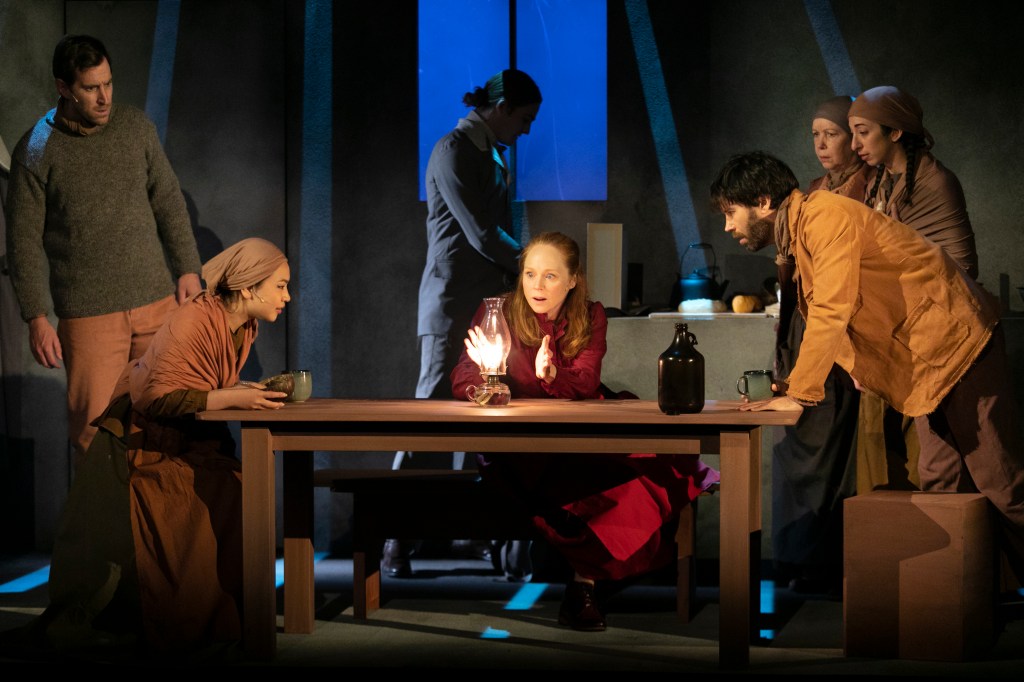May is feeling suffocated by the demands of family life. She is cold, hungry, and pregnant, and never has a moment to relax. One night, a stranger arrives with a kerosene lamp, and the family warm their hands around it. When the stranger leaves, the glow of his lamp remains…
Oil is a five act non-naturalistic play, written by Ella Hickson and directed by Adam Mitchell. It uses forgotten pasts, imagined futures, and the moments in-between as vehicles for exploring concepts of finitude, circularity, consumption, power, love, and personal freedom. Time travel is a given, and is treated as naturally as geographical relocation. The vast difference between the age of oil and the length of a human life makes this stretch a necessity, but it is also a hook on which this play’s brilliance hangs.
Spanning five historical periods, the complexity of Oil’s subject matter is emphasised through the moral ambiguity inherent in the choices of individual characters. Through these characters – especially May and Amy – histories, societies, and priorities are explored with specificity, emotion, and impact. By focusing closely on one central mother/child dyad, Hickson takes the political, and makes it deeply personal. The storytelling speaks for itself, and it is grand.
Oil touches upon racism and the British exploitation of oil-bearing lands, and hints at current geopolitical tensions, predicting terrifying future potentialities. The journeys of the characters take place alongside the history of oil, in a cohesive and resonant interplay. Hickson breaks old ground in new ways, re-orienting capitalist and patriarchal viewpoints by drawing attention to the absurdity of supposed normalcy. For example, by drawing attention to the casual ways in which corruption is committed in pursuit of oil, because ‘we need it.’
Each act includes a collection of elements that are fundamentally the same but importantly different. Names, personalities, and trajectories alter and shift, but never completely transform. This doesn’t translate as being predictable or stagnant, but works as a powerful mechanic for underlining circularity. Intentional repetitions highlight important parallels, like the links between coal, oil, and nuclear fusion. Differences in detail direct attention towards similarities across eras, attitudes, and personal circumstances.
Several scenes are set in kitchens, and focus on the relationship between a mother and her daughter. In this way, Hickson reframes historical emphasis, enabling the play to explore and critique aspects of colonialism, patriarchy, and capitalism without reinforcing outmoded cultural narratives. Amy and May are close enough to these narratives to participate in them, but separate enough to comment objectively and non-polemically on systemic and structural issues, to varying degrees.

Observing the opening of each act feels analogous to witnessing magic unfold. From the meaningful repurposing of the Act I farmhouse in the future, to the lavish red curtains and exotic wallpaper of Act II, every set extends the stage invisibly into a fully formed world through appearance, sound, and implication.
Act III boasts a kitchen with a microwave, a fridge and a table long enough to lie on. The red accents of the previous scene are swapped out with green geometric 70s wallpaper. Matthew Marshall’s dramatic lighting and Melanie Robinson’s sound design augment and enhance the atmospheric artistry of every scene. Specific colour combinations recur throughout, like blood on a handkerchief, or a glow in the darkness. Zoë Atkinson’s set and costume designs show particular strengths in world-building, subtle symbolism, and total aesthetic immersion.
Lead actor Hayley McElhinney – whose long list of credits includes How to Please a Woman and The Babadook – is stunning as the play’s protagonist, May. The power in her performance intoxicates, as does the sassiness, humour, and depth she brings to the role. Her electric interactions with other characters, particularly Joss (Michael Abercromby) and Amy (Abbey Morgan) pull on the heart strings as much as the intellect.
Melbourne-based Abbey Morgan (Bad Behaviour) plays Amy as an eight-year-old, a teenager, and a fully grown woman, nailing each incarnation just as well as if she’d actually time-travelled. Perth’s Will Bastow (Playin’ Possum) is hilarious as Amy’s boyfriend Nate, an activist, ‘but only for some issues, like whales.’
Grace Chow (Mystery Road: Origins) shines as futuristic Fan Wang, who speaks of the availability of intimacy robots, and a new world order. ‘If we have the chance to educate you, we owe it to you to do so,’ she says, in an ironic reversal of problematic past rhetoric.
Violette Ayad, Polly Low, Tinashe Mangwana, St John Cowcher, and Will O’Mahony give impressive performances as the 11 characters they cumulatively inhabit, some of whom carry echoes of characters who came before.
Read: Theatre review: D*ck Pics in the Garden of Eden
Hickson’s intelligent dialogue is already cognitively addictive, even more so in the way her play is brought to life by this outstanding cast and crew. Unforgettable one-liners abound; funny, political, and heart-wrenching, often all at once. ‘I thought that men would be better by the time you grew up,’ is as memorable as, ‘If you hate what I do, take over… be the generation in power… it can’t be someone else’s fault forever’.
Every aspect of Oil speaks to the quality of this world-class production. It’s hard to be pulled back to reality when you’ve just spent 162 years tracking the demise of a civilisation, writ both large and small across the structures of wider society and the minutiae of individual lives. Audiences will either give standing ovations, or be frozen in the cold grip of existential terror.
Oil by Ella Hickson
Black Swan State Theatre Company
State Theatre Centre of WA, Heath Ledger Theatre
Director: Adam Mitchell
Set and Costume Designer: Zoë Atkinson
Lighting Designer: Matthew Marshall
Composer and Sound Designer: Melanie Robinson
Vocal Coach: Jean Goodwin
Assistant Director: Scott McArdle
Stage Manager: Sue Fenty
Cast: Hayley McElhinney, Michael Abercromby, Abbey Morgan, Will Bastow, Grace Chow, Violette Ayad, Polly Low, Tinashe Mangwana, St John Cowcher, Will O’Mahony
Tickets: $30 – $110
Oil will be performed until 27 November 2022.






